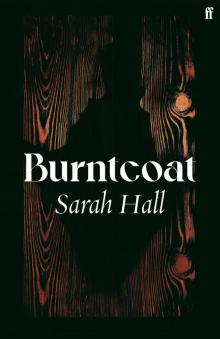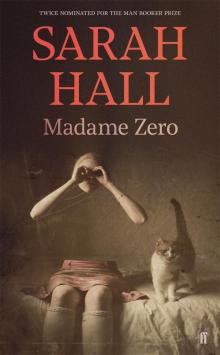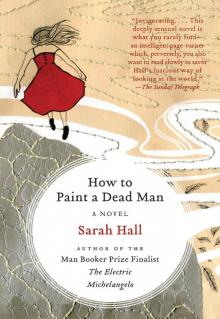- Home
- Sarah Hall
Sex and Death Page 8
Sex and Death Read online
Page 8
‘Oh, Clément, I love being here with you,’ Cora heard herself say. ‘I just – I am just so relaxed and so happy here that I know I will be sad when I go home. So, yes, I am sad. I am sad because of that.’
The smile returned to Clément’s mouth. He pressed a finger to Cora’s nose. ‘Yes, of course, I love you, too. But we are here just for some days, so we should enjoy them because probably we will never see each others again.’
Had he actually said that? The three significant words? Did this need dealing with? Or did that verb not signify in the French language, wherein aimer, as Cora understood it, could be applied to dental floss? Nevertheless, he got the important part right. Three more days and that would be the end of this ghastly interlude. The least painful strategy was just to let it go.
A chatty bosun stopped by to deposit on their table a bottle of room-temperature rosé and a tulip made of fudge. Cora inhaled a glassful, and then another, with thirsty gratitude.
‘But we don’t know the future, do we?’ Clément observed, between bites of tulip. ‘Do you think maybe we will see each others again?’
‘I hope so,’ Cora said, miserably.
‘Who knows? Maybe it will be years from now.’
‘You’ll be sixty-three. I’ll be eighty-four.’
‘Yes,’ said Clément. ‘Probably I’ll be very fat again.’
‘I’ll be bald, except for a few long, scraggly pieces here and there.’
‘Yes, but you will still look very beautiful to me and we will get married and I will take you to Corsica for the honeymoon.’
‘And I will be rotting away from diabetic necrosis, and my vagina will fall off in our nuptial bed.’ Cora said this more loudly than she should have in the close confines of the boat and laughed harder than this crassness warranted. Clément winced. With a kind of pugnacity, Cora leaned in close and put her lips to his cheek.
*
When the love barge had looped its hawsers around the great glansish stanchions at the dock, the lovers cleared the gangplank at a loss for what to do. It was close to ten o’clock. They hadn’t yet had dinner. Clément mittened his palm around Cora’s fingers. ‘I think let’s just go be cosy in the hotel and order something to the room.’
This prospect caused the pulp in Cora’s teeth to sweat. What Cora wanted was a temporary lobotomy whose effects would not flag until she was down for the night. Though she was not a dope smoker, she said to Clément it seemed a shame to visit Amsterdam without at least setting foot in a hash bar. She proposed that they first get massively high and then go eat dinner stoned.
They settled on a modern, brushed steel hash bar where electronic music twordled at an unpunishing volume. At the counter, Cora selected from a touch screen a single pre-rolled joint of something called Dum-Dum Superkush. Its advertised effects were a ‘painkiller couch-lock and steady rolling body rushes’. A quilt over the bird cage was what Cora wanted, and this seemed to be that.
Upstairs, they took a seat on a lucite bench zazzling internally with laser beams. Clément borrowed a lighter from their neighbour. She was a pale girl with straight bangs and vermilion lipstick which, in the cone of light from an overhead bulb, struck an eyepuckering chord against her bright yellow coat. She was French, as it turned out. A lilting patter sprang up between her and Clément, of which Cora understood every tenth word or so. Séjour, chouette, formidable, bière. Kids’ stuff. It was fine with her to be left out. She sucked sincerely on the joint and felt her skull sear.
Projected on the far wall was a loop video of clips to delight fried minds. Footage included a baboon besieging a plum bush, an ant massaging serum from an aphid’s rear, time-lapse cloud action, sealife resembling neon insoles in a rippling jamboree. Mixed in with the trip-out clips was cross-cultural quotidiana: traffic in Beijing, Third World wedding ceremonies, old Italians playing bocce in the park. Cora chortled dumbly at it. ‘You are really having a serious time with this movie,’ said Clément.
‘Whoever made this has a fantastic job,’ said Cora. ‘You could show a roomful of stoned people footage of a mud puddle, and we’d think it was the codex to the secret of the universe. How do I get into this business?’
Here, the French girl put her oar in. ‘Henk made it,’ she said. ‘He owns this place, but he’s a very famous artist, too. Is very provocative.’
At ‘famous artist’, Cora’s hackles pricked. She suppressed a childish temptation to tell the girl who the real artist in the room was. She watched on. After a sparky clip of manholes being minted, the provocative vision of Henk the video auteur asserted itself. Here was footage of the World Trade Center in flames. The tiny figures at the lip of the smoking wound, mustering the fortitude to leap. Cora gave an audible cry.
‘What is wrong, sweet thing?’ Clément said, taking her hand. ‘Can you fucking believe this?’ said Cora, gesturing at the screen.
Clément nodded and pronounced the footage, ‘Pretty intense.’
‘It’s not intense, it’s fucking appalling,’ Cora said. ‘I guess this right here defines the culture’s metabolism. Ten years is what it takes for a mass murder to become just another funky thing that went down. Still, I’d be interested to know how the asshole who made this gave himself permission to treat the deaths of three thousand people as though it were, you know, an improvisation on a theme of double rainbows or a sneezing cat.’
‘You are American?’ said the girl.
‘Yeah,’ said Cora.
‘Okay,’ she said, as if to say That explains it. ‘I think you don’t get Henk’s point.’
‘And what is Henk’s point?’
‘His point is that, okay, you come in here, you get stoned. There is still a real world out there. There is still serious shit going on. You can’t just pretend that everything is happy and flowers and everything.’
‘And my point is, if you’ve got a brain in your head, you are well aware that there is serious shit going on out there. That Henk thinks he is doing something important or transgressive by reminding us of something that nobody on the planet is unaware of reveals your friend, I think, to be not a great artist but a malignant idiot.’
‘I think you do not know very much about art,’ said the girl.
‘Fine,’ said Cora, her cheeks flushing. ‘I know nothing about art. What I do know, sister, is that on that particular day, I lived on the corner of Warren Street and Church. I saw those people falling from the buildings. I saw bodies on the street. The dust filled my apartment when the towers went down. For the month after it happened, we breathed death, literally. It wasn’t pretty. It wasn’t trippy. And to see this dickhead transform it into a kind of visual incense is not only asinine, it’s fascistic and inhumane.’
‘This is really interesting,’ the girl said. ‘Because, really, this is what I am talking about. Yes, it happened, and for America, it is this holy thing. Oh, yeah, this was done to us, America! On American soil! How dare they! Now we must start wars and kill hundreds of thousands. I am sorry but this is the point of the artwork exactly. To make you look at this thing. Okay, we are in a world where this happens. How do we deal with it? But your reaction, actually, to me, it’s really interesting. For you, this is your drawing of Muhammad. This is the sacred thing of America no one is allowed to touch.’
How to respond to this? While Cora was trying to marshal a storm of furious objections into a disciplined, elegant rebuttal, the words that came out of her mouth were, ‘Go fuck yourself.’
Never in her life had Cora spoken this way to a stranger, but in the moment of silence that followed, she reflected that those three words most succinctly expressed the sentiment she wished to get across.
The girl stared at Cora for a moment. Then she began to laugh. ‘I guess she does not like to discuss ideas,’ she told Clément in deliberate English.
‘Fuck you. You’re a moron,’ Cora said. ‘Don’t fucking talk to me again.’
Clément’s mouth opened. He wrung his hands. The strife seemed to wound
him. This deepened Cora’s irritation. Clément put a hand on Cora’s knee. He began to ply the girl with a torrent of apologetic French, begging forgiveness for his lover, the coarse and barbarous crone. The blood roared in Cora’s ears. What was Clément saying? She could dope out a lone recurrent word: femme blah blah femme. Elle est femme? Is that what she’d heard? She is woman or she is wife?
‘Woman or wife?’ Cora said.
‘Pardon?’ Clément said.
‘Femme. Femme. Femme. What are you talking about, Clément? Are you telling her I’m your wife?’
Confusion presided for an interval. Then the girl’s sudden laughter cut a channel through the laserlit bank of smoke. ‘Faim,’ she said. ‘Hungry. You are a bitch because you are hungry, is what he says. Not wife. His grandmother, maybe. Don’t worry. Nobody thinks you are his wife.’
Out on the street, Clément strode not quite at escape velocity, only fast enough to make it clear that he didn’t care whether Cora kept up or not. They did not talk. Still immensely stoned, Cora was having a hard time tracking the valences of the fiasco in the bar. What was the thing that most needed apologising for? That she’d crushed him by accusing him of pretending to be her husband, which Clément, the Oedipal oddity, actually harboured sincere and weird fancies about? Or was he simply disgusted by her brattiness, her sanctimony, and that she’d made herself absurd?
Cora’s mortification was physical: a film of cold foil plating the bones of her shoulders and her spine.
At the end of the block, Clément ducked into a corner grocery. Cora felt unwelcome to follow him in. Nor could she summon the mettle to walk back to the hotel alone. There was nothing to be done but shuffle around, feigning fascination with a kerbside banana crate as a rain began.
Clément soon appeared, eating a long, pale sandwich. So much, apparently, for their dinner plan. His other hand clutched a stack of postcards, jumbo edition, half-clad in a wax-paper bag.
‘Oh, you got postcards!’ Cora pointed out.
‘Yes. Right now I am going to write postcards to my friends,’ which population, his tone implied, did not include her.
‘You write postcards! I never write postcards!’ Cora gibbered. ‘That’s great! That’s amazing.’
‘Yes, I write postcards. I like to do it. I don’t think it is amazing. I send them to everyone.’ Using his middle finger as a tamper, Clément drove the last three inches of his sandwich past his lips, chewed and swallowed. ‘The one I sent to you, you didn’t get it, or you thought it was stupid?’
‘You sent me a postcard?’
‘Yes, of course.’
‘From Paris?’
‘Yes, you did not get it?’
‘No.’
‘Okay. Pffft. You don’t have to look like it’s serious. Who cares?’
A postcard. He had sent her a postcard. And how had he gotten her address? The gallery rolodex, of course.
The French postal system was adequate. It was wishful thinking to suppose the postcard had been lost in the mail, or to hope that Clément’s clumsy jottings would be too oblique for Rodney to decode. She had been gone five days. The postcard had almost certainly arrived by now. It was probably large as a shoebox lid and as subtle as a crier with a handbell.
One other possibility, which seemed more likely because it was more hideous, was that Rodney had intercepted the postcard before the trip, that the morning Rodney saw her off with fruit, a kiss and Dramamine, their marriage had already ceased to exist.
Cora returned to the hotel. Clément went off to write postcards to the people that he liked. With the help of three sleeping pills, Cora was legitimately unconscious when her lover’s body creaked into place beside her.
At 4 am her eyes opened and would not close again. Here was a trick of Cora’s undependable brain. While incapable of distinguishing femme from faim, at this late hour, it was chanting, in flawless French, these words: Jouis et fais jouir sans faire de mal ni à toi ni à personne. Voilà toute morale. They were tattooed on the forearm of a Czech philosopher Cora had once photographed. The gist was, Taking pleasure, spreading pleasure without hurting anybody constitutes a moral life.
So the question, as Cora saw it, was: how to knot up the present mess with a minimum of collateral harm? Returning home was essential, as soon as possible. If the postcard was in Rodney’s clutches, well, that was music she would face. If, by some miraculous postal mercy, the postcard had not arrived, she would lie in wait for it and destroy it, after which she would dedicate herself to the expert demolition of her marriage by the least explosive possible means. It was for Rodney’s sake, not hers, Cora told herself, that she feared being found out. The least she could do was tiptoe backwards out of his life, to leave a minimum of footprints and derangements for his next mate to clean up.
Fleeing Clément called for tact as well. Full disclosure was out. To know that his postcard had collapsed a marriage would be a hurtful, grown-up burden for the guileless St Bernard. The only decent thing to do, Cora decided, was to tell Clément that her apartment had caught fire and that she had to board the next flight to New York to deal with the calamity. So great was her concern for Clément’s feelings that she went to the trouble of counterfeiting an email from the building superintendent, bolstered with years-old insurance photos taken after her loft had indeed gone up in flames.
A little before six, she woke Clément, brandishing her laptop and wringing from her actual anxieties a simulated panic that wasn’t so persuasive. ‘That sucks,’ ran the extent of Clément’s sulky, rote condolences. His mood, however, perked up a little at the news that, if he liked, the room was his for the next three days, paid for in advance, incidentals, too. She leaned in for a farewell kiss. With éclat that seemed vituperative, Clément thrust his stale tongue into her mouth.
On the wet dawn streets of Amsterdam, Cora feels giddy, unlimbered, scrubbed clean. Suffusing her is a spirit of melancholy clarity that is not so far from joy. It does not degrade until the airspace over Boston, when the plane’s descent begins.
At 6.30 pm, she debarks into a decrepit terminal. The ceiling is underpinned by conical tarps to catch rainwater and sloughing plaster. The linoleum underfoot bears cigarette burns dating to the Idlewild period. Intimations of age and dereliction season very nicely the dripping meal of despair on which Cora inwardly feeds just now. No word from Rodney, or from Clément, on her telephone.
The parking lot attendant exacts from her a punitive sum. Cora pilots her Volvo through the balky bowels of the transterminal roadway. Blocking her path are vehicles that, after Europe, seem cottage-sized. It is Good Friday. Cora rides her brake through a street fair of embracing Catholics. At last, her way is clear to the leftmost lane, where the traffic flows free. She gooses it, then screeches to a bumper-nodding stop. A middle-aged woman has selected the fast lane toward the highway as the place to board a cab. She is obese. With her is a boy of seven or eight. Cora blasts the horn at her with both thumbs.
‘Would it kill you to be patient for five seconds?’ the woman yells.
‘Five seconds looking at your fat ass?’ Cora retorts through the open window. ‘Yeah, it might!’
The shock on the faces of the woman and the child is legible and pure. Even Cora is a little stunned. First go fuck yourself to the French girl in the hash bar, and now this.
Rodney would not have stood for it. He would have insisted that she apologise and, failing that, stepped out of the moving car and apologised on her behalf. The nastiness to strangers has something to do with her husband. It is the tentative flexion of a powerful muscle Rodney has long been trying to train her not to use. Now she can use it if she likes. Out of Queens she speeds, feeling potent and bleak.
The sound of running water welcomes Cora home. Rodney is showering. There are no packed suitcases on the kitchen floor. The postcard, Cora permits herself to hope, has not penetrated the apartment. Her lung capacity briefly doubles.
But here is the mail, heaped on the wallward end of the k
itchen table, where it is always heaped. This evening the irrelevant mass of windowed envelopes and coupon circulars assumes a brazen, evidentiary quality. She rifles it. Between a catalogue and a credit card offer is Clément’s postcard. It is what was once known as a ‘French postcard’, a cyanotype of a woman’s naked torso, plastered with sycamore leaves. The text on the back is not an exact accounting of cunnilingus past and pending but close enough. Cora’s aorta pumps vinegar. The shower cinches off with a baying of intramural pipes.
What will Cora do as a single woman of forty-four? She will reactivate her gym membership. She will learn to relish solitude. She will give up alcohol. She will take daily comfort in loving fatuities with her little dog. She will strive for a life of work and continence with her heart nowhere nearby.
Now here is Rodney fresh from the shower. Black underpants are all he wears. His body is a totem of amiableness. Thick skin the colour of two-minute toast, boyishly innocent of visible fat or muscle. Hairless save a furred naevus on his left scapula, shaped like a paramecium. So familiar is she with this body, she reflects, she could probably pick from a line-up any domino-size sample of her husband’s flesh.
Cora dislikes personal photos. She neither takes them nor looks at them. Yet she is tempted to ask Rodney, before the hashing-out begins, if he would consent to prostrating himself on her light table and permitting every part of his anatomy to be photographed. But Rodney speaks first.
‘So,’ he says, twisting a pinky in his ear. ‘They’re doing dollar oysters at that place on the canal.’
Cora and Rodney go eat oysters at that place on the canal. The postcard goes unmentioned. In the weeks that follow, Rodney is unusually kind to Cora. He makes her coffee in the morning. In the evening, he rubs her horned, yellow feet. Cora suspects that Rodney’s gentleness with her is weaponised, a force multiplier for when he finally drops the bomb. The weeks wear on and Cora’s preparedness for his exit erodes. At some unsuspected and maximally harmful moment, she knows, the confrontation and departure will take place.

 Sudden Traveler
Sudden Traveler Burntcoat
Burntcoat Madame Zero
Madame Zero Mrs Fox
Mrs Fox Sex and Death
Sex and Death How to Paint a Dead Man
How to Paint a Dead Man The Beautiful Indifference
The Beautiful Indifference The Wolf Border
The Wolf Border The Electric Michelangelo
The Electric Michelangelo